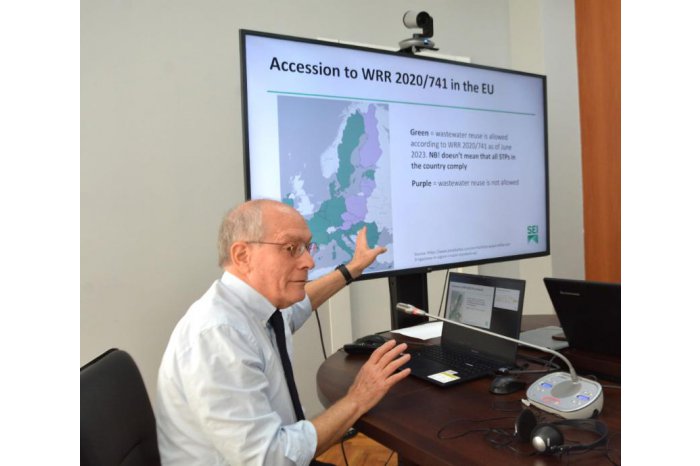
Study on reusing wastewater in agriculture launched by Stockholm Environment Institute and the Ministry of Environment of Moldova
Chisinau, 10 October /MOLDPRES/ - Stockholm Environment Institute (SEI) has partnered with the Government of the Republic of Moldova to launch a study on the potential of using wastewater in agricultural irrigation in Moldova.This forward-thinking initiative, led by SEI and conducted by national experts, aims to support Moldova’s forthcoming decision on whether and how to implement the use of reclaimed wastewater for agricultural irrigation, in accordance with the Regulation (EU) 2020/741 of the European Parliament and of the Council on minimum requirements for water reuse.
The study, taking place from October 2024 to December 2025, is comprised of two phases: an initial screening, followed by an in-depth evaluation. It is part of the Green Agenda for Armenia, Georgia, Moldova, and Ukraine project, funded by the Swedish International Development Cooperation Agency (Sida). The study will be conducted in close cooperation with both the Ministry of Environment and the Ministry of Agriculture and Food Industry of Moldova, along with other national stakeholders.
''Moldova is one of the most climate-vulnerable countries in Europe. As climate change and water scarcity are increasingly pressing issues, the study will explore the use of treated wastewater as an alternative source for irrigation. Optimal methods for utilizing this water will be analyzed that consider quality, available quantity and soil compatibility, as well as associated risks and advantages. Additionally, the study will assess the costs of implementing water treatment systems,'' the public association, EcoContact, said.
At the launch event, representatives from the Swedish Embassy in Moldova, the Ministry of Environment, and the Ministry of Agriculture and Food Industry gathered with SEI and national experts to set the stage for the study. Participants endorsed the study, provided recommendations to consider in the coming period and identified the actors involved in this process.
Gheorghe Hajder, the State Secretary at the Ministry of Environment, highlighted the importance of sustainable water resource management as a top priority: “Water quantity and quality are becoming increasingly important. We aim to promote the sustainable use of water, thus aligning our efforts to integrate into the European Union."
Victoria Gratii, Chief of the Policy Direction for Integrated Management of Water Resources at Moldova’s Ministry of Environment, added: “Considering the impact of climate change on water resources, we believe that promoting the principles of a circular economy - specifically, the sustainable use of water resources - aligns perfectly with our country's efforts to integrate into the EU. Reusing treated wastewater in agriculture can address water scarcity when other measures are insufficient; however, a range of factors must be considered. We are confident that the newly launched study will offer support and recommendations for the correct implementation of EU Regulation 2020/741, which relates to the minimum requirements for water reuse."
Thomas Alveteg, the Deputy Head of the Development Cooperation Section and Analyst at the Swedish Embassy in Chisinau, welcomed the inter-ministerial collaboration, emphasizing the importance of inter-institutional cooperation in promoting viable solutions for water reuse in the context of alarming climate change and water scarcity for irrigation.
Arno Rosemarin, Senior Research Fellow at SEI, said: “Moldova’s Government and stakeholders agree on the study's needs. SEI has engaged leading experts for the project, marking a significant step toward success. Reusing wastewater could help address irrigation water scarcity, but upgrading treatment plants to meet agricultural standards presents a challenge. We look forward to working with the Government, national experts, and key stakeholders to find innovative solutions to address this issue.”
The Green Agenda for Armenia, Georgia, Moldova, and Ukraine project aims to align Moldova’s policies with the European Green Deal, facilitating a transition towards sustainability and paving the way for future EU accession.
DOC // INI head promoted to rank of commissioner
December 18 - National Police Day; Moldovan interior minister describes day as success of great team
Clearer procedures for resolving civil, commercial disputes involving Moldova, State of Israel
Leuseni-Albita customs post temporarily suspends operations
Young people of Moldova can get study scholarships in Hungary
Moldova's Evaluation Commission to hear two anti-corruption prosecutors
MMPS to enhance support for young families and job seekers
Moldova to implement 48 new external assistance projects
VIDEO // More efficient control and safety for citizens: National Integrated Border Management Program approved by Government
One-off childbirth allowance to be increased from 1 January 2026
Government launches new call under National Nursery Program, to invest 385 million lei over next two years
Reevaluation at Central Court of Appeal: Magistrate failed external assessment
Environmental Protection Inspectorate to have new head
PHOTO GALLERY // 107 years of tradition and 100 years of exhibitions: historical milestones of Chamber of Commerce and Industry captured by MOLDPRES
One more magistrate fails to pass external evaluation in Moldova
Crossing of Maiaki-Udobnoe bridge suspended again following another drone attack
Nicolae Testemitanu Medical University of Moldova, Swiss Red Cross sign agreement on training of resident students, physicians, pharmacists
Modern transport for pupils of Moldova: 23 minibuses delivered to schools nationwide
Moldova receives 150 million euros from EBRD for strategic road modernization
Traffic on Maiaki-Udobnoe bridge in Ukraine partially resumed
Head of State, EBRD President discussed development projects and attracting investments into Moldovan economy
Ministerial meeting of Energy Community: Moldova reaffirms commitment to building secure and competitive regional energy market
Moldovan Governor at BNM 2025 – European Momentum Conference
Traffic at Moldovan-Ukrainian border partially suspended after drone attacks in Ukraine
Parliament Secretariat officials engaged in experience exchanges with European Parliament and Parliaments of Austria and Albania
Moldova launches tender for construction of large wind power plants with storage batteries
Intraday electricity market launched in Moldova
Strengthening Moldovan-British cooperation on agenda of discussions between Finance Minister and Ambassador Fern Horine
VIDEO // Enhanced waste management infrastructure in Ruseni village, Anenii Noi: individual bins for residents
DOC // NBM issues commemorative coin - Moldova in Single Euro Payments Area

